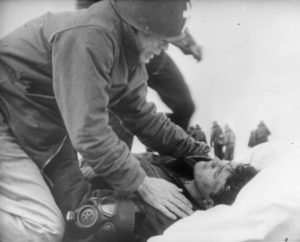No Stone Unturned: Extreme Unction
The account in the Gospel where our Lord heals the son of a Capharnaumite ruler takes place early in Christ’s public life. (cf. Jn. 4:46-54)
This ruler, having heard something about Christ that impacted him, begs our Lord to come to his house and heal his son, who is at the point of death. Christ rebukes the man over wanting to see signs and wonders in order to believe.
But the man persists, and our Lord heals his son–albeit not in the way he requested.
Our Lord’s word was sufficient for him, and this ruler would merit to receive from Christ not only the cure of his son, but the gift of faith, and faith even for his entire house. So in healing the body, Christ also ministered to the soul.
All the Sacraments of the Church have a specific purpose.
God knows best what our souls need most, and Christ organized the means by which all the needs of the soul are attended to throughout life, provided the necessary dispositions for their reception are present.
If there was not a true need–that is, if there was not a real impoverishment on our side, there would be no Sacrament for it.
So when it comes to bodily death and serious illnesses linked to death, there exists with it a corresponding spiritual condition that requires a special Sacrament, a special channel of grace that is both a support and a remedy for this condition.

With the powers of hell running out of time to claim its prize, and with depleted energy on our side from illness that leaves us weakened to resist the special types of temptations that may come, Christ leaves us with a weapon that supplies us with the graces we need most at these moments. So we should take example from the faith of this ruler, which prompted him to seek Christ out to help his dying son, and have prompt recourse to the sacrament of Extreme Unction (or Holy Anointing) whenever there is danger of death, either for ourselves or someone we love.
Regrettably, a challenge we face in our modern day is a world that has become incredibly desensitized to death. People generally live in a state of denial about death and the reality of a particular judgment before God and an afterlife which could either be quite happy or quite the opposite.
Catholics are not exempt from this, which is manifested by the widespread disregard of the importance of Extreme Unction.
Often the priest is not called because either the family does not know to do so or – and this is common – does not want to alarm the person who is dying.
Christ tells us that the Son of Man will come like a thief in the night and we do not know the day nor hour. So, all things being equal, how we live tends to be how we die.
While our time on earth is a time of mercy, the fact that many assume nowadays that anyone who has died must now be in a “better place” amounts to a grave presumption on Christ’s mercy and does a tremendous injustice to souls who, although perhaps saved, stand in great need of our prayers to temper the satisfaction God demands in purgatory.
This may remind us of the children at Fatima who asked our Lady about the state of soul of a teenage friend of theirs who recently died, and our Lady replied that she would be in purgatory until the end of time.
Although that may be a little discomforting to hear, what it proves is the reality that Christ indeed gives us everything we need in the way of grace to enter heaven upon death and that He wants it to be used while He stands ever-ready to assist us in our trials and labors.
He leaves no stone unturned.
If there is a way, He finds it, He makes it happen.
And so Extreme Unction serves as the final medicine for us in our preparation for death, judgment, and what should be heaven, made possible only by Almighty God.
November 11, 2020








